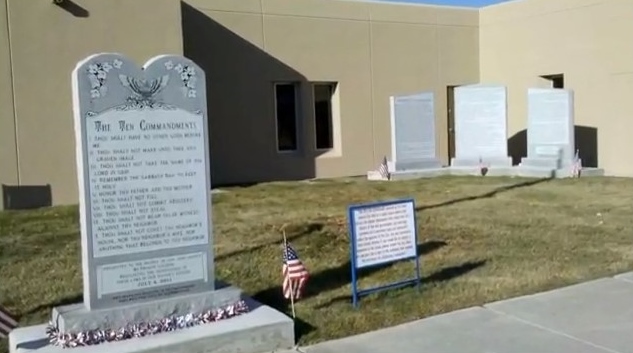 BLOOMFIELD, N.M. — The 10th Circuit Court of Appeals has upheld a lower court order to remove the Ten Commandments from the lawn of Bloomfield City Hall in New Mexico, declaring the display to be an unconstitutional endorsement of Christianity.
BLOOMFIELD, N.M. — The 10th Circuit Court of Appeals has upheld a lower court order to remove the Ten Commandments from the lawn of Bloomfield City Hall in New Mexico, declaring the display to be an unconstitutional endorsement of Christianity.
“Bloomfield has not undertaken sufficiently purposeful, public, and persuasive actions to secularize the Monument’s previous ‘principal or primary’ religious message,” it wrote on Wednesday. “The City has never explicitly said this Monument was not for religious purposes, nor that it was exhibited only for its historical significance.”
As previously reported, the monument at issue had been erected in 2011 following a resolution allowing private citizens to place historical displays at Bloomfield City Hall. A former city council member had proposed the monument four years prior, which was then approved by city council but paid for with private money.
“Presented to the people of San Juan County by private citizens recognizing the significance of these laws on our nation’s history,” the monument read, which was unveiled during a special ceremony on Independence Day 2011.
But Wiccans Jane Felix and Buford Coone of the Order of the Cauldron of the Sage felt offended by the monument and contacted the American Civil Liberties Union (ACLU) for assistance.
“Our clients who are not Christians, they took issue with this and it made them feel alienated from their community,” Alexandra Smith, legal director for the American Civil Liberties Union (ACLU) of New Mexico, told local television station KRQE.
The organization filed a lawsuit against the city in 2012, asserting that the monument’s presence on government property amounts to the government endorsement of religion. While the city argued before the court that the monument was historical in nature, the ACLU contended that the content of the Commandments themselves is blatantly religious.
“One of the commandments is thou shalt put no gods before me. This is clearly not a historical document, but is in fact religious doctrine,” Smith stated.
In August 2014, U.S. District Judge James Parker, nominated to the bench by then-President Ronald Reagan, sided with the Wiccans, declaring that the Decalogue violated the First Amendment to the U.S. Constitution.
“In view of the circumstances surrounding the context, history, and purpose of the Ten Commandments monument, it is clear that the City of Bloomfield has violated the Establishment Clause because its conduct in authorizing the continued display of the monument on City property has had the primary or principal effect of endorsing religion,” he wrote.
The city appealed, and on Wednesday, the 10th Circuit upheld Parker’s ruling, stating that the addition of historical monuments adjacent to the Ten Commandments did not fix the constitutional infirmities.
“[I]t was especially inadequate here because of the plain religious motivations apparent from the approval (approved alone), financing (sponsored entirely by churches), and unveiling (ceremony rife with Christian allusions) of the Monument,” the three-judge panel wrote.
“In light of those considerations, and the situational context of the Ten Commandments on the lawn, the City would have to do more than merely add a few secular monuments in order to signal to objective observers a ‘principal or primary’ message of neutrality,” it concluded. “Because we find an impermissible effect of endorsement that is insufficiently mitigated by curative efforts, we affirm.”
The case was decided by Judge Robert Bacharach and Carolyn McHugh, nominated to the bench by Barack Obama, as well as David Ebel, nominated to the bench by then-President Ronald Reagan. The decision was unanimous.
The religious liberties organization Alliance Defending Freedom (ADF) says that the city is considering an appeal.
“As the U.S. Supreme Court recently made clear, a constitutional violation doesn’t occur simply because a person encounters speech he finds disagreeable and ‘experiences a sense of affront,'” remarked legal counsel Jonathan Scruggs in a statement. “In this case, a Ten Commandments monument nestled among many other monuments honoring significant documents in American history shouldn’t be attacked simply because two people feel offended by it. For these reasons and others, we are consulting with our client to consider their options for appeal.
Become a Christian News Network Supporter...


